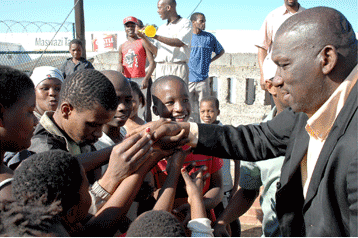|



Defending the Weak through the Budget
It doesn't take an expert to see that the budget speech presented by the
KwaZulu-Natal
MEC for transport, safety and security Mr Bheki Cele in the legislature last week is
aimed at defending the weak, those who cannot fend for themselves and their families.
It is against this background that 75% of the department's budget was allocated to road
infrastructure development.

When the MEC presented his first budget in the legislature he made it clear that the budget
was geared towards defending the weak in the province because each programme was precisely
intended to ensure that the roads the department build benefit the poorest communities the
women and men folk of not only Durban North and Umlazi, but also to the men and women at
uMsinga, oPhongolo and eNhlazatshe. He said that the challenge that was facing the
department of transport was that how to ensure that road planning network were integrated
such that communities in the deep rural areas had access to schools, clinics and hospitals.
"But the bigger question is how do we ensure that the budget we present today defends the
weakest thus contributing to redressing the imbalance of the past particularly, alleviating
poverty," asked Cele.
Cele said that it was common cause that during his tenure as MEC for
Transport, Premier S'bu Ndebele championed the right of poor people to share in the economy
of KwaZulu-Natal. "It is now my intention to consolidate the many gains that have already
been made by programmes such as Zibambele, Vukuzakhe and public transport subsidies to create
work and enterprise development opportunities for poor and vulnerable KwaZulu-Natal citizens,"
said Cele. "It is also my intention to build on our solid platform of empowerment programmes
and prepare for an exponential growth in the construction and transport sectors through the
development of major infrastructure projects such as the Dube Trade Port and the upgrading of
the Gauteng / KwaZulu-Natal transport corridor as well as the infrastructure investments
associated with the 2010 Soccer World Cup." The MEC said he was pleased to inform the
legislature that his Department was working closely with eThekwini Municipality in planning
their "rural road network. Ethekwini Municipality has committed significant budgets to upgrade
and develop its rural road network and has already adopted the department's flagship programmes
Zibambele and Vukuzakhe.
When presenting his budget which is divided into five programmes in the legislature, Cele said he
was pleased to announce that 94% of the department's budget went to the core functions of the
department. For road infrastructure the MEC allocated R1.3 billion. He said this amount of money would
strike the between the need to maintain existing infrastructure and the need to develop new strategic
corridors and provide communities with access roads. Under this
programme, Cele announced that R200
million will be allocated to the African Renaissance Road Upgrading Programme
(ARRUP). "This
programme makes extensive use of local labour and supplies and allocate 70% of its overall budget
towards black economic empowerment which include emerging
contractors(Vukuzakhe)," said Cele.
With regard to Zibambele Cele said that the department has set a target of 40 000 Zibambele contracts.
"We have planned to achieve this target by 2009, and this financial year we have budgeted for 24 000
Zibambele Contracts." Currently the department has 17 000 Zibambele contracts.
While R1.3 million was allocated for administration, Public transport received R30.9 million excluding
R4 million for bus subsidies.To create a safe road environment through the annual reduction of road
crushes, Cele allocated over R254 million for traffic management and road safety. For community based
programmes which encompasses poverty alleviation programmes, women empowerment, youth and learnerships,
Cele allocated over 27 million.

 back
back
|